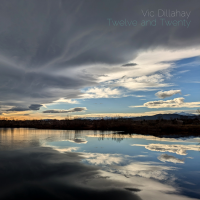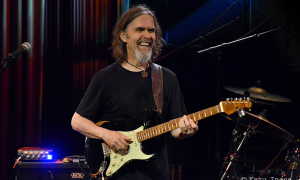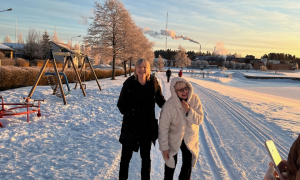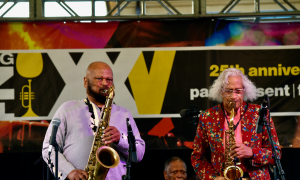Home » Jazz Articles » SoCal Jazz » Philippe Coignet: The Fusion of Paris, Rio, and New York
Philippe Coignet: The Fusion of Paris, Rio, and New York
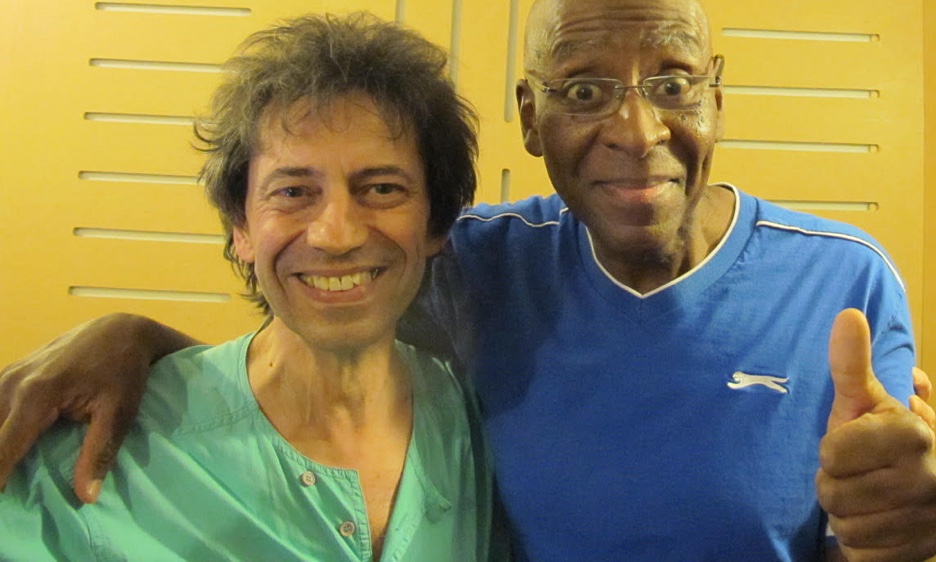
Courtesy Aubrey Dupont
I generally know exactly what I want the sound to be and that is what I end up with. This time the rhythm section brought so much adventurousness and creativity it brought about change. The music can be taken to places you didn't expect or didn't even know it could go to.
—Philippe Coignet
While the focus of our conversation was the rich fusion of Paris Rio New York (Kwazil, 2020), the most humble and engaging Coignet also touched on his previous work, the art of composition, how it all began, and what's up next.
All About Jazz: Bonjour Philippe. I was about to say good morning, but it's a bit later than that in Paris, so good evening.
Philippe Coignet: Yes, early evening here, but good morning to you. Bonjour, how are you doing, Jim?
AAJ: Good, we have spoken a fair amount through emails, Philippe, great to have this chance to speak for real.
PC: Yes, the virtual world can be kind to us.
AAJ: Well, my first introduction to your music is your most recent fusion recording, Paris, Rio, New York. That's a terrific record, that features many outstanding musicians, including virtuoso guitarist Mike Stern. That was preceded by a world music album and a foray into Latin music. Let's start current. First of all the band name of EHA [ long A-ha ], what does that mean or stand for?
PC: First of all let me apologize for my English. I will do my best to answer your questions, but feel free to make me sound a little better if you choose to(laughing).
AAJ: I'd say you are doing well. I don't get much passed bonjour, au revoir, and merci in French. So you're way ahead of me(laughing).
PC: Well, you know, EHA actually means nothing. It is just something that came to be that I thought sounded good.
AAJ: (laughing) So no big mystery or any deep meaning there?
PC: No, I'm afraid not. Hopefully I saved that for the music.
AAJ: No doubt you did, on all three records. Paris Rio New York is a deep dive into fusion. You write all the music, work on the arrangements, and, of course, play guitar on the record. With so many complexities and artists involved it had to be a challenging process. You managed to line up extraordinary musicians from all over the world. Tell us how you managed to get all the pieces of the puzzle in place.
PC: Well, first I must say that I have an accomplice, that I have known for more than twenty years, who is heavily involved in the arranging. My keyboard player, Leandro Aconcha from Suisee [Switzerland], is most talented. He is a great pianist, that plays so very beautifully. He can use all the synthesizers very well and has great strength in programming. After being very much involved with the first two records, EHA (Iris Musique, 1997) and Fortune (Kwazil, 2007), he was excited to be involved in this project. We spent sixteen days programming the songs so that we could first send them to the rhythm section. We created a techno jazz recording so that their parts would be very clear.
AAJ: To clarify at the outset, the final product was far from a techno recording. It very much has a hands on feel. As you say, you did that to present the music to the musicians.
PC: Yes, correct. It was a backtrack for the rhythm section to play within. I always much prefer to have the human touch. Some of the synthesizer parts sounded really great. Probably could have used them as is. But that is not what I like to do.
AAJ: So much better to have actual musicians playing the music.
PC: Yes, otherwise you lose all the many nuances and improvisations. Leandro also synthed all the brass arrangements to my compositions. He did so very much. The woodwind arrangements are just amazing. But, as far as the collective, yes it was interesting how it came together. The record needed to have the true sound from these parts of the world integrated. That what was in my head, so I really strived for that. I'm not one to settle. To start with though, the rhythm section are both Frenchman. Drummer Damien Schmitt, who has played with the incredible French legend Jean-Luc Ponty brought a lot of improvisation from behind the kit. Bassist Michel Alibo, from Martinique [ A Carribean island in the domain of France ], recommended Schmitt, after our original drummer was unable to do the project. Michel told me he was a white Paco Séry. I didn't need to hear anything more. He was right and it worked out so very well. They had such terrific chemistry and interplay. Out of thirteen musicians on the record. only four are from France.
AAJ: You had mentioned previously having known Mike Stern for like twenty five years. Had to be cool to finally get the chance to play together. Great cat, incredible guitarist.
PC: Oh yes, Mike brought so much to the record. It was such a great privilege to play with him. He had heard my first record over twenty years ago, when he was touring in Paris. He told me back then that we just had to do something together. It took awhile, but it finally happened.
AAJ: He brings a certain presence.
PC:Yes, Jim, as you know he is a living jazz legend. He raises the bar.
AAJ: Yes, but part of what made the record so strong is that the overall International cast are in the same league. We have talked about compositional and arrangement strengths, however you had to have top shelf musicians all the way around to make this work.
PC: Yes, and I knew and had played before with half of them and the other half I had not. So, that brought a unique chemistry of comfort mixed with fresh conversation and interplay. I have a fantastic percussionist that has been with me since the beginning, Colombian percussionist Juan Manuel Forero. Mario Contreras from Chile, is another fine musician I have played with a lot. He added percussion and played the tiple. The tiple is a small South American guitar. The great Argentinian percussionist Minino Garay joined the band, and added his own style to the rhythmic diversity. We had played together back in the nineties. A most important new cog is Cacau de Queiroz. He brought vitality to tenor, alto, soprano, and baritone saxophones and also played the flute. He has such a great personality both as a musician and as a human being. We too had played together, but it was over twenty years ago.
AAJ: Queiroz was also responsible for resourcing the other woodwinds, was he not?
PC: Yes, Cacau was the head of the woodwind section and I asked if he could bring in a trumpet player, as well as trombone and tuba player. I knew that anyone he would add would be a top notch player. Brazilian trumpeter Rubinho Antunes was touring in Europe at that time and was able to record his trumpet parts at his own studio in Sao Paulo. Lionel Segui, who is from here in France, performed on both the trombone and tuba. Here is where the story gets a little funny. We took a break from recording and we were having lunch at a local cafe. Walking back to the studio we ran into American saxophonist Sulaiman Hakim. He had played with Alibo before. We told him what we were working on and invited him over to the studio. He was very excited about it and really wanted in. He sat in and ended up playing on most of the record. I had never played with any of these musicians, other than Cacau, ever before.
AAJ: Well that explains much of the fresh chemistry and new ideas I heard on this record. Interesting how all that came together. A bit of luck never hurt anyone.
PC: Yes, it's true. I wanted many different sounds. I had solos, for saxophone, for guitar, trumpet, piano, flute, even bass, but I felt like I needed something else as well. Andy Narell is one of the best steel pan players in the world. Another that I had never played with before. He is American, from New York, but now lives in Paris. Michel Alibo, our bassist, plays with him in a different band. So, I was able to connect with him and he was the final piece of the puzzle. He recorded in his own studio and it was just perfect. Something very different that has its own color and substance.
AAJ: In the end it became an interconnected maze of cerebral fusion. The diversity of these cultures basically created a new sound in itself.
PC: Well, I like to think so, and I appreciate that you heard it that way. I have always enjoyed mixing different cultures. It has always interested me and made sense to do so. Good people are going to sound good together.
AAJ: Were there any surprises along the way? Did the record come out the way you had it in your head or a bit differently?
PC: That is actually a very interesting question, as my first two records I knew exactly the sound I wanted and that is what I ended up with. But this time, for example, the rhythm section of Alibo and Schmitt brought so much adventurousness and creativity that brought about change. The first two records were very clean, well played, with great grooves. They played it perfectly. But see, here, it went beyond that into a space that could not be predicted. The music can be taken to places you weren't expecting or didn't even know that it could go to.
AAJ: Every song is a world onto itself, with its own story line and presentation. One thing that stood out to me, the very first time I listened to it, is the unique variance in instrumentation. Horns, flutes, violins, saxophones popping in giving each song a new feel. It lends itself to a broad listening experience that stays fresh from start to finish. It would seem to be a consideration of integrating the right sound and instruments for each song. How much of that is in the composition?
PC: Ah yes, very well. I write differently than many jazz composers. It is pretty standard to have a good melody, hopefully a good melody, and then have soloists play on the chord progressions, moving back to the melody. I often end somewhere else. In that it creates other possibilities to be found or created. Yes, I don't want a sameness from one song to another. There were some songs here that I had played before live. Others that I wrote just for this record. So it is a good question, Jim. The compositions have to come from their own place and stand alone. Every step along the way is onto its own. That's true of the composing, arranging and playing. I must say that everyone brought so much heart and energy to this project. I am so very happy about that and very proud of this project.
AAJ: As you should be.
PC: Thank you.
AAJ: As for songwriting, whether for this record or in the past, where does it come from for you? Do you methodically sit down and focus on composition or is it more that some occurrence in your day to day life inspires you?
PC: Well, it's kind of a mystery in a way. It's hard to explain where the inspiration comes from. It can be a feeling or it can be an idea for the structure of a tune. You can start with different progressions and see where it leads you. It may lead you to an inspiration. Sometimes it's very precise with a very simple melody. "1984," the first tune on Paris Rio New York is of that category. A case of having a simple melody in your head and keeping it there. I first had that melody in my head, believe it or not, in 1984. I was at a jazz festival in the south of France. I finally had the right opportunity to use it and wrote the song over twenty yeas later. Then another way I will write is to put a song on the album that starts out just as chord progressions. On this record it is the last song, "Queen of my Nights." I had no solos written for it, absolutely nothing. I told Leandro that the middle section was for a piano solo and to do whatever you want with it. I told Cacau that the end is a flute solo and to do whatever you want with it. I did the same with the front end on my guitar. The funny thing is that this is the song that the radio stations grabbed hold of, and started playing first. Then, too, you can have a song that is much more complex, such as "2 Stars in my Skies." Much different in one part than it is in another. I like a song to go somewhere you don't expect—more than just following the melody.
AAJ: Really something having that tune in your head since 1984. Like a fine wine, its time will come. The record is the culmination of many years, many ideas, many musicians, and a lot more. Thanks for sharing the details. Changing gears, how old were you when you first started playing the guitar and listening to music?
PC: I started playing guitar when I was fifteen. I wasn't much interested in music before that. What I had heard in school didn't appeal to me at all. We had a guitar that my grandmother had given us about three years earlier. It went in the closet and stayed there for some time. My younger brother took it out one day and started messing with it. He proved not to be interested. I picked it up and it became a passion and very quickly I knew I wanted to be a musician.
AAJ: Amazing how that happens, but I have heard that story before, that there is just this instantaneous connection. So, what kind of music did you start playing and listening to at that time?
PC: I started a rock band when I was in high school. I was listening to all the great rock. The British Revolution. The Beatles, The Rolling Stones, The Who from the early sixties and then Jimi Hendrix, Led Zeppelin, Pink Floyd, and all that stuff. That was a golden age of music. Every two or three years there was a whole new revolution. From the beginning, of course, but then in 1966 there was Hendrix. Nobody had ever done anything like that before. In 1969, oh my gosh, you had the hard rock of Zeppelin and Deep Purple that was a whole new thing. In the same year you had King Crimson. People were wondering what this was all about. Nothing close to that had ever been heard. Then there was Carlos Santana mixing Latin with rock. That was all new. There had never been so many revolutions of music in such a short time. That hasn't happened since and very unlikely that it ever will. I teach some guitar lessons and I talk about all this music, as I want them to be exposed to it. I have to be careful though, not to come off as an asshole. You know, like I'm saying today's music isn't any good. Once they hear it though, they generally realize what I am talking about. They will hear something on a radio station in their car and then be wanting to know more and hear more of that stuff.
AAJ: Well, great music, the genuinely great music, even further back then the sixties, will always hold up. It's a matter of exposure. Did you have formal guitar lessons?
PC: No, never. I am completely self taught. I was very passionate about it. I worked very hard, as I knew then that this is what I wanted to do. I knew that I wanted to play music and be a professional musician.
AAJ: Music school, music college?
PC: No, my parents were very against the idea of music as a profession. They didn't consider being a musician as having a profession. So, I learned by playing with and watching other guitarists. You know, I had friends that were perhaps older, definitely better, than me. I paid attention and asked questions. I'd ask, "So, how do you make that chord right there, how did you just do that, what are you doing there?" I never felt alone. They either showed me or I figured it out. So that and a lot of time and dedication. I, of course, too would try to play what I was hearing on records. But that's not so difficult when you are passionate about it. You really want it. The only lessons I ever took were for the saxophone.
AAJ: Okay there's a curve ball. I didn't know you played the saxophone.
PC: Well, I don't necessarily play it all that well. I don't play it on a recording. It is just something that interested me. Actually the story is that I was asked, many years ago, to do the music for a musical version of Ray Bradbury's The Wonderful Ice Cream Suit. I needed a saxophonist for one song. I didn't know anyone so I sought out to find one. I went to see the director of the musical school in the city. It turned out that none of the current students were quite at the level yet, so he said that he would do it himself for free. I was quite young at that time and he was nice enough to help me with the project. I asked him if I could join in on the saxophone class, even though it was already in mid term. He said okay and I ended up doing that for four years. I knew pretty quickly that I was never going to be able to play it a very high level, but I enjoyed it. It was just for fun.
AAJ: You had mostly been playing rock. I understand this isn't the reason that you did it, but did learning the sax help you ultimately with jazz appreciation and ultimately composing, arranging etc.?
PC: The funny thing is that my saxophone sat quietly and peacefully in it's case for over twenty years. I just recently took it out. The answer to your question though is yes, of course. An understanding of what the brass and woodwinds are all about is to better grasp their connection in the bigger picture.
AAJ: Growing up listening and playing rock, when did jazz enter the picture?
PC: Well, all along pretty much. That's is to say that when I would purchase a Rolling Stones record, I would buy a Wes Montgomery record at the same time. It was always like that, and I was listening to other music as well. I have great admiration for all the great jazz and fusion guitarists and have had the privilege of meeting or talking to most of them. In fact, I should share with you, Jim, that a few years back I was working for one of the jazz magazines in Paris and did interviews much as we are doing today.
AAJ: That's cool. Did you enjoy doing that?
PC: I did, but it is a lot of work. I respect what you are doing so well. I know that it takes a lot of time to transcribe an interview and make something out of it. So, I thank you and appreciate it very much. One thing I would always ask the guitarist is, "what is the most important thing for you in music?" I, of course, received many different answers to that question, sometimes amazing and sometimes disappointing. I will share with you what I believe to be the best two answers I received. One is from the incomparable Mike Stern. Mike simply said, "playing with your heart."
AAJ: Four words that speak volumes.
PC: Yes, so very much so. The other was, "Le beaute" (beauty), spoken by John McLaughlin.
AAJ: Ah, that's sweet. No need to give a long winded answer when one word can say so much. So, what is your answer to that same question?
PC: Well, I echo what Mike Stern said for sure, I would add that it must tell a story. It isn't just a bunch of notes following each other on a piece of paper. It has to relate a story to the listener. You must have something to say.
AAJ: For sure, yes. Excellent answer. Most definitely. Your records are very personal, proud accomplishments. You have referred to them as your babies.
PC: (laughing) Yes, I do think of them that way. Even though I do have actual babies, children.
AAJ: Our focus today was on your most recent record, Paris Rio New York, but let's talk a little bit about that first baby, which was world music.
PC: EHA already existed and we had been playing live gigs for about six years. In 1995 we had a very strong band and I thought it would be a good time to start working on our first recording, EHA(Kwazil, 1997). It was actually difficult to do. It involved several studios and a lot of mixing. After that, though, I was able to have a record company sign us immediately. They really liked the tunes. We ended up getting a lot of radio airplay in about twenty-five countries.
AAJ: Yeah, well it's a record that grabs your attention. It makes a lot of sense now that you say that the band had been together for a long time. It's very tight, and there are some excellent compositions.
PC: I feel it could have been a big break out recording, but unfortunately it was a small label that had neither the money nor the savoir-faire, and it just didn't get quite enough attention.
AAJ: An unfortunate part of the business. But your first born is still a diamond in the rough.
PC: I thank you for that. I am proud of it.
AAJ: Although I have never had the pleasure, your music, from any of your records, would just have to be great in a live setting. This past year aside, obviously, playing live and touring is a big part of your deal, yes?
PC: Oh yes, very much so. We really enjoy that. It is also a big challenge. We have been quite successful and many people really like our music heard live. We look forward to things getting back to normal and getting back out there and playing. EHA is a very good live band and something we just really love to do.
AAJ: Latin music would better describe the second EHA record, Fortune(Kwazil, 2014). It's lively and as melodically strong as it is rhythmically.
PC: I had two songs that we had played for a few years, that I left off of the first record. They both have a Latin edge to them, so I just didn't think they really fit on the world music record. So, I decided to write some other material with that kind of sound and put out a Latin flavored record.
AAJ: Without being able to play live this past year, that left a lot of time for composing. How many more songs do you have written at this point?
PC: Well, Jim, I have enough material for three or four more records. But, of course, we will take it one at a time. I have asked all the guys on the last record and they are all in to do a new record. I am referring to the core band, not special guest stars like Mike Stern.
AAJ: I had a hunch you would have a lot in the tank. You have offered up different genres in your first three albums. That leads me to believe that number four will bring on yet another element. Are you going to do a polka record?(laughing)
PC: (laughing) Not this time. I would like to do a record somewhat like Paris Rio New York, but less violent. One that is more acoustic. I have some very good compositions that will be better with acoustic piano instead of electric. I want to keep the continuity of the last record, but not so hard and electric. Jazz and world music, but this time without the progressive rock feel. I have thoughts of a different acoustic record as well, with acoustic bass, acoustic piano, acoustic guitar. I have compositions that tell many historical stories.That is a direction I would like to go.
AAJ: Oh, that's very cool. No shortage of ideas floating around in your head. Not too many artists could successfully smoke out so many distinct genres in their first four records. That's definitely something to look forward to and a positive note to close out this song. Continued success Philippe, and thanks for the long distance chat.
PC: So much my pleasure, Jim. Thank you so very much. You are most kind.
AAJ: Talk to you soon, au revoir.
PC: Au revoir. Hope to see you in Paris someday.
Tags
PREVIOUS / NEXT
Support All About Jazz
 All About Jazz has been a pillar of jazz since 1995, championing it as an art form and, more importantly, supporting the musicians who make it. Our enduring commitment has made "AAJ" one of the most culturally important websites of its kind, read by hundreds of thousands of fans, musicians and industry figures every month.
All About Jazz has been a pillar of jazz since 1995, championing it as an art form and, more importantly, supporting the musicians who make it. Our enduring commitment has made "AAJ" one of the most culturally important websites of its kind, read by hundreds of thousands of fans, musicians and industry figures every month.












